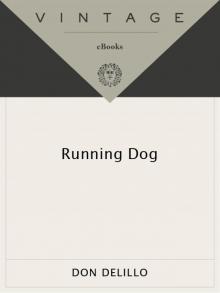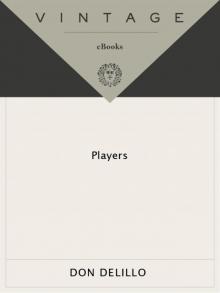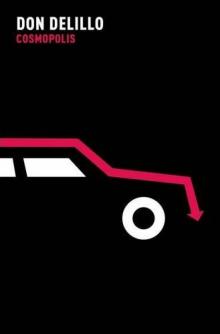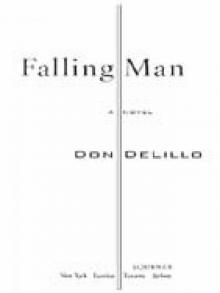- Home
- Don DeLillo
Great Jones Street (Contemporary American Fiction) Page 7
Great Jones Street (Contemporary American Fiction) Read online
Page 7
“Of course I act like a child. Of course I revert. Of course I’m anal.”
“Burnt skin, Opel, use mink oil soap. And your hair looks like an Arab’s been chewing on it. Use a comb to style. Use a brush to condition. And rinse with Jell-O, sweetmeat.”
I continued to breathe, never before conscious of the effort needed to generate this act. People passed supernaturally across the room, leaving contrails of smoke and scented ash. Others settled around me, moving their lips. All were breathing, sullenly pumping blood, embarked together on a perverse miracle. Our movable parts carried us past the edge of every deathly metaphysic. Our organs, lifted from our bodies, plucked out with silver pincers and left laboring on bright Tiffany trays, would comprise the finest exhibit of our ability to endure. Euphoric with morphine we’d be wheeled among them, noting proportions and contours, admiring the beauty of what we were. In death, our opened bellies dripping, we’d be placed in refrigerated elevators and sent soundlessly into the earth. Above, our organs would be tagged and stored. Or, if found defective, fed to the poor.
“It’s axiomatic that history is a record of events. But what of latent history? We all think we know what happened. But did it really happen? Or did something else happen? Or did nothing happen?”
The pipe-smoking man crossed and uncrossed his legs, a shade of vaudeville in the genealogy of his movements. He banged the pipe into an ashtray, inspected the bowl, blew into the stem, inserted a grimy pipe cleaner. Around him people spaced from birth passed chocolate kisses hand to hand. The pipe-smoking man began to refill his pipe, treating the instrument with appropriate manly endearment.
“I’m Morehouse Professor of Latent History at the Osmond Institute. But I don’t occupy the Morehouse Chair. I occupy the Houseman Chair. This professorship deals with events that almost took place, events that definitely took place but remained unseen and unremarked on, like the action of bacteria or the rising and falling of mountain ranges, and events that probably took place but were definitely not chronicled. Potential events are often more important than real events. Real events that go unrecorded are often more important than recorded events, whether real or potential. At one time sixty per cent of the population of black Africa was white. We have tools and femurs. But we’re not sure what happened to this blue-eyed race. Were they wiped out by wars and disease? Did they sail away in long wooden ships? We’re still sifting materials at the Homer Richmond Blount Memorial Wing of the Institute and we hope to have some answers very soon. One of the major thrusts of latent history is to avoid a narrow purview. We’re presently assembling evidence about the French Revolution indicating that a dissident faction of the sans-culottes used to assemble secretly under cover of dark for the sole purpose of wearing culottes. They’d strut around all night in foppish knee breeches. An orgy of strutting and posturing. At daybreak they’d get into tight-fitting pantaloons and go back to their revolutionary activities. History is never clean. In some cases less happened than we suspect. In other cases we merely suspect that less happened. It’s axiomatic that people in the Middle Ages went to bed early. We’re studying this to learn what effect it had on the Hundred Years’ War dragging on for as long as it did. Latent history never tells us where we stand in the sweep of events but rather how we can get out of the way. I myself am currently doing a paper proving that the Reformation, as such, never took place. The Counter Reformation was a response to something that never happened, as such. The Nile once flowed into the Amazon. We have sediment to prove it. What dreams did it carry? How much of the blood and poetic impulse of all of us? These are among our central concerns at the Institute.”
Lloyd Boyd stood in the doorway, then spotted me and came over. Lloyd was an actor who’d recently served time on a charge of reckless endangerment. Since his release he’d been living in Grand Central Station, sleeping on benches or in the doorways of clam bars. He told me he tried to think of Grand Central Station as his apartment. One room but a nice size. High ceiling. Nice big window. Marble floor. Centrally located, always important for an actor making the rounds. A little bit noisy and could be more heat. But the high ceiling made up for everything.
“I got depressed so I took an antidepressant.”
“As who wouldn’t?”
Lycra Spandex lived with her mother and sister in Lefrak City. I didn’t know where Vegemato lived. Lynn Forney lived with Notorious Nora and the Seventh Fleet on Avenue B. Jerry Dane lived in an East German Vopo greatcoat. Tia Maria used to live in a city bus abandoned under the West Side Highway but truck drivers on their way to the meat terminals used to ram the bus for fun, sometimes stopping just long enough to rape Tia Maria, more or less, and finally she moved into a storefront church presided over by a man who wore spats and claimed to be a direct descendent of Mohammed. I closed my eyes a moment, aware of a woman’s voice depositing names at my feet.
“Bucky, this is Zenko Alataki, who happens to be Axel Gregg the documentary film-maker’s brother-in-law, and I’m Axel’s sister Lillian, Zenko’s wife, Lillian Alataki. My husband’s just up from northwest Mexico to raise some money for the earthquake he’s been working on down there. Just make sure you don’t call it art. It’s not art. It’s back to before art. Fire-building and the fingering of testicles. The wonder of pre-information is that men perceived the earth and themselves actually in the process of changing. Zenko’s been trying to create pressure along a fault with a series of very delicate TNT explosions. Just a few more in the right places and he’ll have his small quake. The greatest work of art ever achieved. Except don’t call it art.”
“Is this true?”
“Why not?” Zenko said. “The continents ride on plates. The crust shifts, which causes breaks or faults. The beauty of a man-made fracture is that you can photograph the adjacent surface. Place objects on the surface and take aerial photographs of the objects toppling. I call this a kinetic shiver. Objects toppling. Objects being swallowed up. If society wasn’t so obsessed with false values, I would be permitted to use live animals in my shivers. Sheep, goats, some rabbits. Earthquake technology enables man to give back to the earth. Goats being swallowed up would make a perfect shiver. It’s an act of sacrificial love. We give back. The earth takes and is greener. How much do you weigh?”
“Is this the first shiver you’ve worked on?”
“This is the world’s first shiver,” he said. “I’m being prudent but bold. Life-serving destruction is always bold. How much do you weigh? Have you noticed what a very emaciated group this is? It’s as though you’re all disappearing before my eyes.”
Opel went to bed fairly early in the evening. People crawled over and around her, and a few of the more forlorn simply remained at her sides in little ribbons of woe. Diane Bowie took a teddy bear with her into the bathroom. Voices seemed to burn slightly. People bit the tips off chocolate kisses, bad teeth, smudged fingers, horrible posture. Winona Barry said she’d advertised her sewing skills in a West Village newspaper. A man called, wanting a nun’s habit and crotchless riding pants. They bargained in spare phrases. “Extra for perversion.” “Money no object.” “Extra for satiny underthings.” “Do a sensitive job.” “Extra for the hole in the riding pants.” “I’ll send plenty more business your way.” Miss Mott tried to dial the time on Opel’s phone.
“My sister has a new fella,” Lycra Spandex said. “He’s a detective with the safe, loft and truck squad. He took one look at me and nearly gagged. How do I tell a fella like that about the childhood I spent dreaming of lash curlers, mascara, highlighters and toners? Can I explain to a plainclothes man about gauzy blouses, long flared skirts, superbitchy underwear, chokers, earrings, pins and clips? He’s a plainclothes man. He wouldn’t understand, would he? Do I dare tell him what it means to wear eye shadow and have skin that’s rose-petal soft? All my life all I’ve ever wanted was to be two people. Marge and Gower Champion. Alternating day to day. Can I confide in this detective? Can I explain about the whole Fox Movietone era and those girls in tut
us jumping over the sawhorses? This detective spent his entire adolescence hitting other kids with bicycle chains. I’m supposed to tell him about my sheer pantyhose that do away with crotch sag? Sorry but I won’t play that game. I know what’s best for Lycra Spandex. Lycra Spandex does not have to kowtow to authority figures, even when they’re with the police department of the city of New York, even when they’re with the safe, loft and truck squad. If the son of a bitch is so great, why doesn’t he get me a decent loft to live in, or a safe where I can keep my crappy jewelry, or a fucking truck that I can drive over a cliff?”
A tall pale girl stood near my chair. Her red hair was in pigtails and she wore paint-streaked jeans and a T-shirt with a hole in the middle. I leaned over and touched her arm. Therefore I am. She turned and I put my mouth to her navel. This made her laugh and twist a bit. Softly her thumbs browsed about my ears. Her navel was lint-free, abnormally large, an inner moon of convolutions and repose. There was no reason to wonder who she was or how that level moment was rounded by her hands.
“Name’s James,” someone said. “Heard and enjoyed your stuff. Third album’s a landmark work. Stunning album. Noise and screaming and babble-babble. Heard all your albums and all your singles and liked them all and that comes from someone who’s kind of famous in his own right except nobody knows it. Mylon and I. I’m a friend of Mylon’s. We live in the same piss-hole building. I gather you’re laying back. Understandable. There’s nothing to paint and nothing to write and nothing to film and nothing to sing about and nothing to make love to. But your sound comes out of the radio all the time. Stunning sound. Amazing when you think about it how your sound is big even out there in the sticks and boondocks where I come from originally, the absolute sticks, the deep boonies, where it’s unlike a big city where people can absorb that kind of sound. Your second LP is killer too but I think number three’s the landmark work.”
Mylon Ware stood in a corner talking to no one. He was a folk singer from western Canada, a lean bleak man with strange eyes. His second winter in New York he killed and ate his dog to keep from starving. People had offered him food and urged him to go on welfare but he took nothing, listened to no one, said not a word. The dog was a German shepherd, bought for protection, and very hard to kill. Mylon began by using the long bar that was part of his police lock. The first blow wasn’t severe or direct enough and the bar proved too long a weapon for the kind of struggle that followed. However it was useful for holding off the dog while Mylon maneuvered with his hunting knife, also bought for protection. It took him fifteen minutes to kill the animal. When it was over, almost nothing in the small apartment stood in the same place or was free of blood. Mylon cut the dog up and over a period of four days cooked and ate whatever seemed edible.
“This is the last party.”
“The first act is better in the New York production. The second act is better in the London production.”
“Kiss.”
“This is my vision. Everybody in the whole world wearing each other’s underwear. Whole nations exchanging underwear. China doing Egypt’s laundry. Big strong Turks wearing panties from Scarsdale. A people thing. I’m pro-people all the way. It would help us so much. I see it in my mind’s eye. Special fourth-class rates for underwear. Cargo ships full of underwear plying the trade routes. This is my vision. Underwear chain letters. World peace through underwear.”
“I admit I whimper. I admit I’m fantastically infantile most of the time. I admit I want to sit on the floor and say ma-ma, da-da, na-na.”
“For a Filipino she’s practically statuesque.”
“Winona’s little baby is the shittingest little baby you’ll ever want to see. That little baby should have its own agent. That baby has a talent no other baby will ever come close to. I told Winona get on the phone to William Morris. That little baby should have an agent.”
“This is the last party. Pass it on.”
“I’ll tell you how I’m shooting this picture. I’m shooting it beautifully. That’s how I’m shooting it.”
“This is the last party.”
“I’m selling comic books on Fourth Avenue. It’s a living, right? Kids come in. College boys with the hair, the clothes, the skin. I sell them old comics. I sell them glossies of Bonita Granville and King Kong. They don’t call it a living for nothing. It’s a living. I live. There’s worse could happen. I at least live. It’s a living. I make a living.”
“This is the last party. Pass it on.”
“The Self is inside the Other. Motion is the guiding mind of the solar community.”
“Happy Valley’s into violence now.”
“Kiss.”
I thought of all the inner organs in the room, considered apart from the people they belonged to. For that moment of thought we seemed a convocation of martyrs, visible behind our skin. The room was a cell in a mystical painting, full of divine kidneys, lungs aloft in smoke, entrails gleaming, bladders simmering in painless fire. This was a madman’s truth, to paint us as sacs and flaming lariats, nearly godly in our light, perishable but never ending. I watched the pale girl touch her voluptuous navel. One by one, repacked in sallow cases, we all resumed our breathing.
11
IN SLEEP I opened an unnumbered door and found the sea. It was wide and still, veneered in delirious silver. Someone I knew was walking along a road that went down a hill toward some houses. The heat was brilliant. Vindictive light burned into the stone of all the small houses chalked near the sea. I heard voices and thought I saw people at the door.
Opel toasted frankfurter buns for breakfast or whatever meal it was. She held the buns on a fork over the burner, toasting the insides of the buns intended for me, the outsides of those intended for her. Each of us thought the other strange for his/her preference. She spread strawberry jam on the buns and brought everything to bed with her.
“I wish we had real strawberries,” she said. “Big whole strawberries to look at and eventually eat.”
“Live strawberries instead of strawberries on tape.”
“I remember traveling literally about six thousand miles in four consecutive flights and then getting to somebody’s house I knew and they were eating strawberries and I just sat there and looked at these strawberries sitting in sugar in the middle of the table and it was inconceivable, it was like returning from the land of the dead. They lived, the strawberries lived. I could look right into them. I understood what strawberries really are, not that I could put it in words. They were inconceivably beautiful, so rich and plump and alive, actually glowing from within. Of course I was probably stoned on something.”
“Who were you talking to at the door?”
“I thought you were asleep.”
“I was asleep but I wasn’t fast asleep. Somebody was at the door and the two of you talked about something. It wasn’t Fenig because I know Fenig’s voice. It wasn’t the woman downstairs because it was a man. So I surmise one thing. It was the man you’ve been waiting for. The courier. Is that who it was?”
“It was the man,” she said.
“Good news or bad?”
“Dr. Pepper is not where he’s supposed to be. But they expect to reach him in forty-eight hours. I don’t know why it’s forty-eight hours. Why not forty-seven or fifty-three? Anyway I’m to be ready to leave at a moment’s notice as of tomorrow night. I told him I’ve been ready for days. He expressed the hope we’d function well together.”
“Glad it’s finally under way?”
“Except one thing bothers me. He wasn’t what I’d hoped to get. I thought he’d resemble some lower-echelon A-and-R type like from Motown. Bronzed glasses, wispy beard, that hunched-over funky walk. I expected pure funk, you know? Someone who’s spent his whole life dealing merchandise of one kind or another.”
“What did you get?”
“I got Hanes,” she said.
“Goddamn, that voice I heard. Hanes. On one level I knew it was him. You didn’t tell me Globke was involved in this.”
“He’s not, Bucky. Hanes is free-lancing. It’s not surprising it’s him really. There are so many people we know in common. If you put all the names on paper and draw lines back and forth, it would probably be very logical that Hanes would be the one to show up at my door. Anyway seeing him gave me an idea. It involves a surprise for you. Your birthday present in fact. Belated maybe but a stroke of true bitch genius.”
“Can’t wait.”
“A gift that’s rich with I don’t know what.”
“Hanes is a human blotter,” I said. “I don’t like it when people like that get involved in this kind of enterprise. He’s very limp. You could pick him up, use him as a blotter and throw him away. Submissiveness and paradox. He’d just as soon do business with the police.”
“I’m nice and settled,” she said. “Go toast more bread.”
It was getting dark. I left all four burners on. We finished the buns and Opel lay in bed eating jam off the blunt edge of the knife. The power of her immobility was beginning to fade. Departure was implicit in everything she did now. Until Hanes appeared at the door, Opel’s presence had been immense; she’d reigned in that bed like a bloated Creole queen of the swampland, giddy with magic, wallowing in the sensual pre-eminence of her own stink. Opel had stolen my immobility. I had been motionless as salt. People had swirled around me and I had plotted changes in the weather, gradations of light and silence. I had centered myself, learning of the existence of an interior motion, a shift in levels from isolation to solitude to wordlessness to immobility. When Opel occupied that center I became the thing that swirled.

 Great Jones Street (Contemporary American Fiction)
Great Jones Street (Contemporary American Fiction) Americana
Americana Running Dog
Running Dog Libra
Libra End Zone
End Zone Ratner's Star
Ratner's Star Underworld
Underworld White Noise
White Noise Players
Players Cosmopolis
Cosmopolis The Silence
The Silence Mao II
Mao II Zero K
Zero K Great Jones Street
Great Jones Street The Angel Esmeralda
The Angel Esmeralda The Names
The Names The Body Artist
The Body Artist Point Omega
Point Omega Falling Man
Falling Man